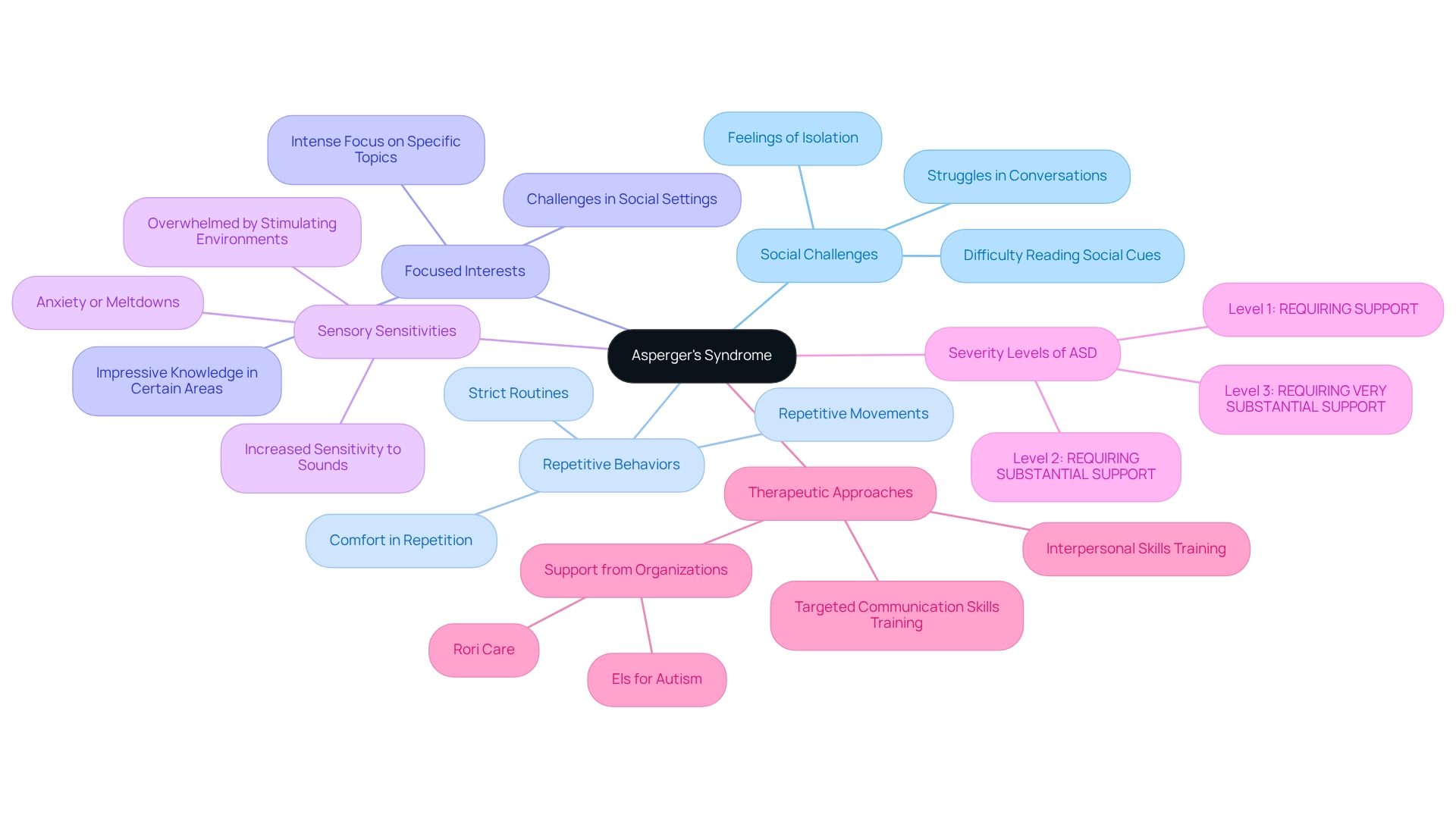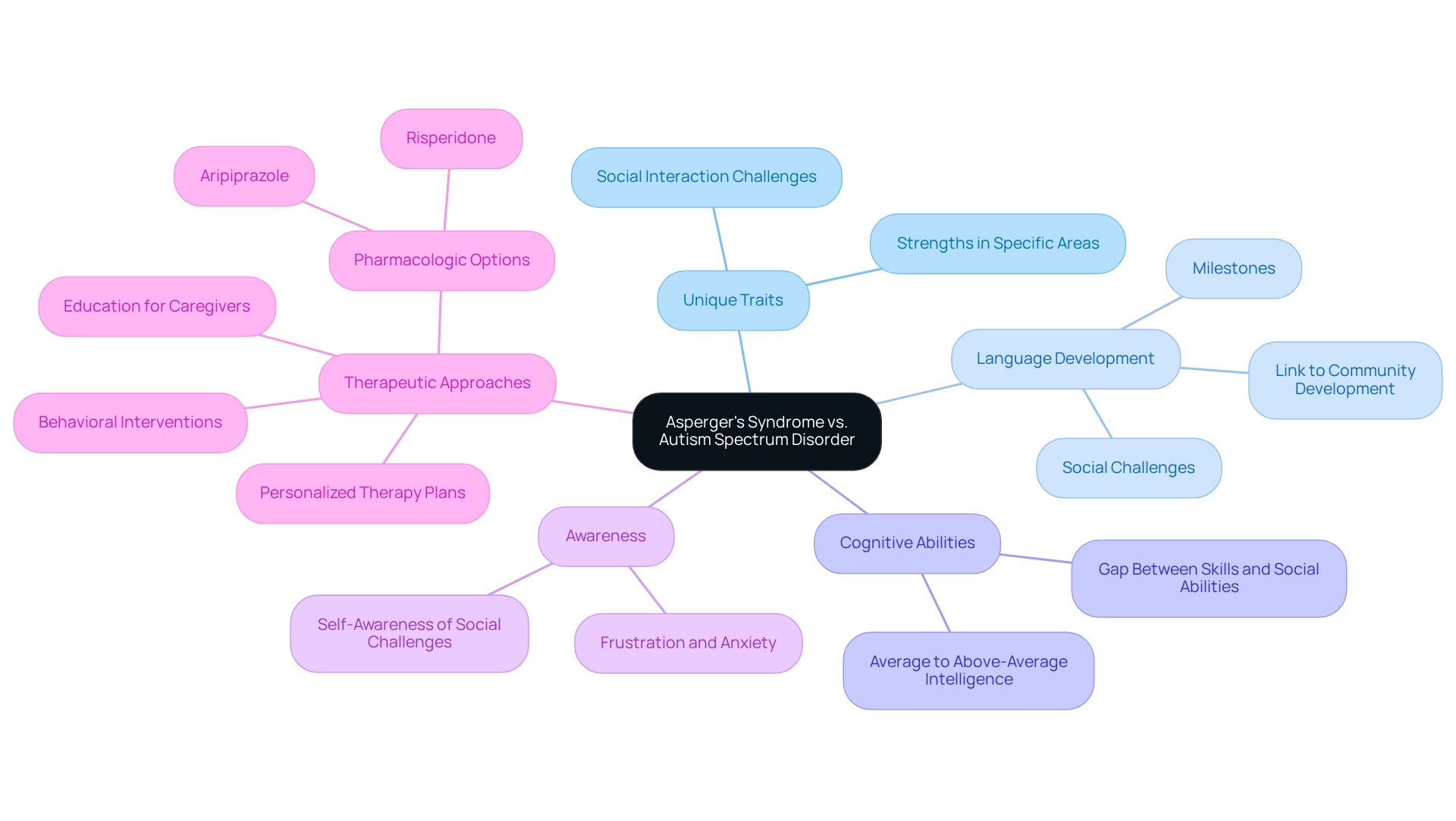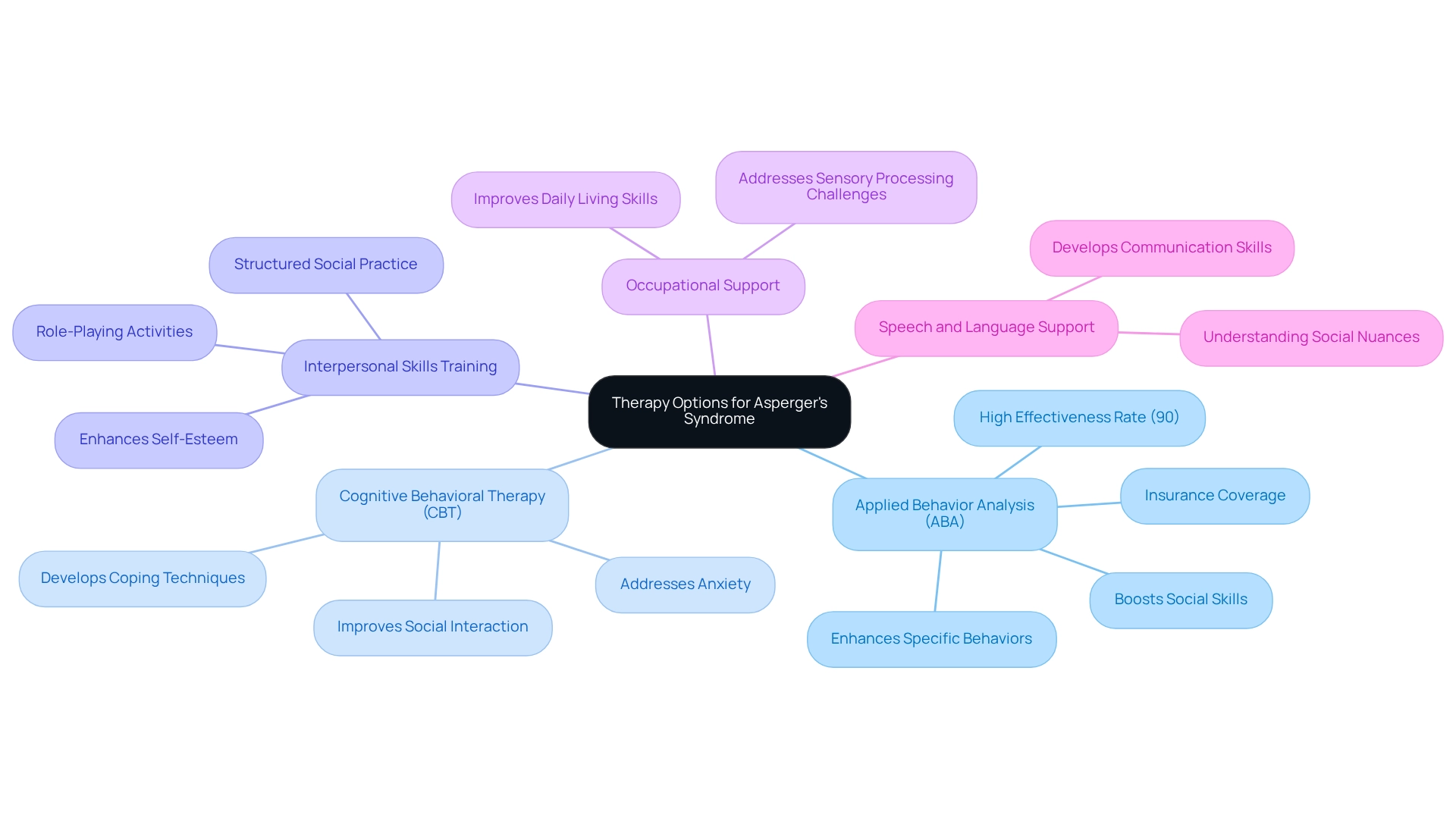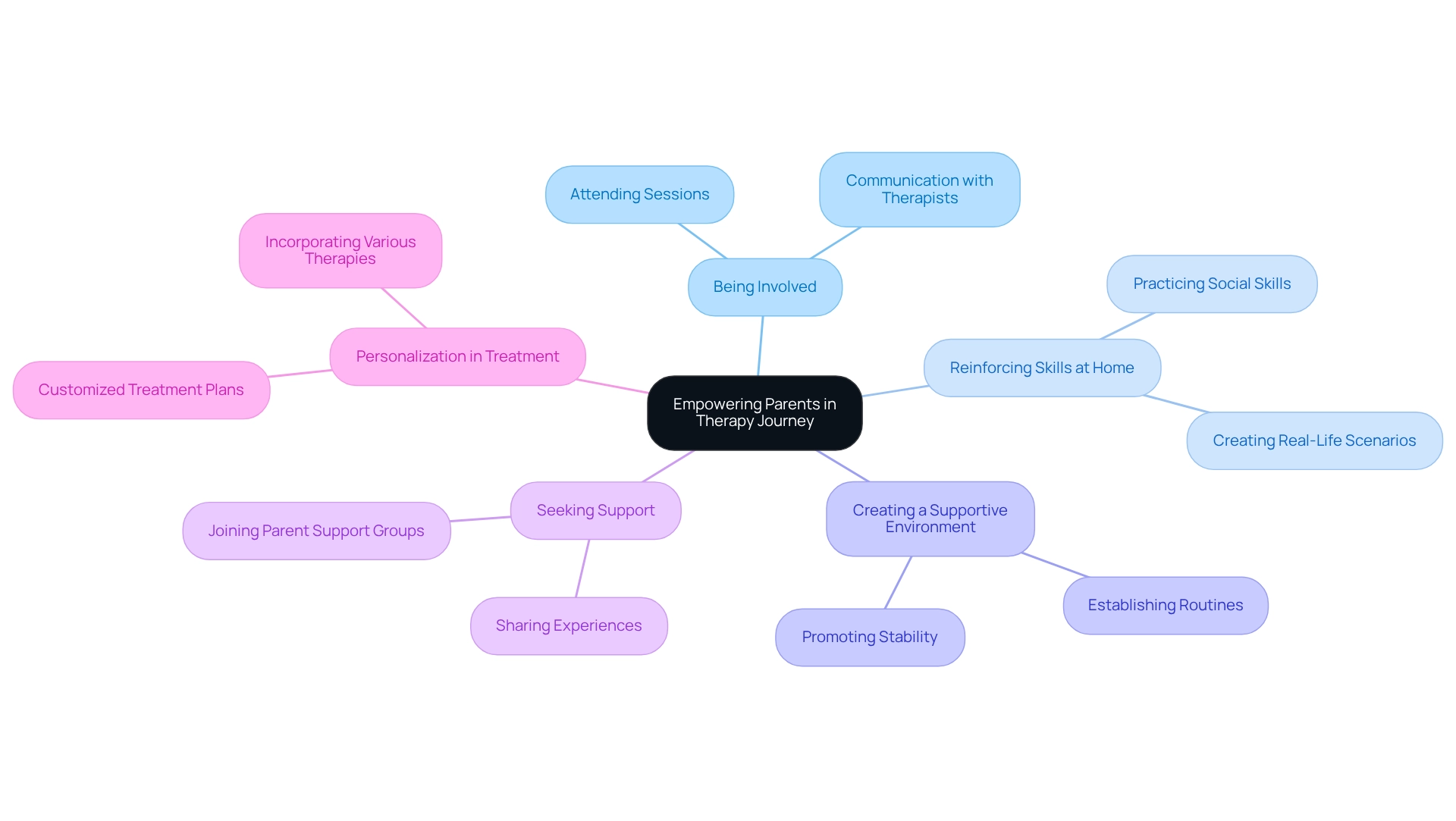This article serves as a friendly guide for parents seeking the best Asperger's therapy in their area. It highlights the importance of understanding Asperger's characteristics and encourages parents to engage in thorough research and assessments. By collaborating with qualified therapists, parents can create personalized treatment plans that cater to their child's unique needs.
Let’s explore this together! Understanding the nuances of Asperger's can be a journey, and sharing experiences can help. By connecting with others who have faced similar challenges, you can deepen your understanding and feel less alone.
As you embark on this path, remember that building a supportive network is essential. Collaborating with qualified therapists ensures that your child receives the best care tailored to their individual needs. We’re here to help you every step of the way!
Asperger's Syndrome, now part of the Autism Spectrum Disorder (ASD), brings its own unique challenges that can really affect social interaction, communication, and behavior. Understanding these characteristics is super important for parents as they navigate therapy options for their children. From social hurdles that make it hard to form meaningful connections to a deep focus on specific interests, kids with Asperger's often need tailored support to truly thrive.
This article dives into the key symptoms of Asperger's, highlights the importance of early diagnosis, and explores the various therapy options available. We aim to provide parents with essential insights to advocate for their child's needs and foster their development. Let’s explore this together!
Asperger's condition is now recognized as part of Autism Spectrum Disorder (ASD) and brings a unique set of challenges, especially in social interactions, communication, and behavior. Understanding these traits is essential for parents searching for Asperger's therapy near me for their children. Here are some key symptoms to consider:
Recognizing these symptoms is vital for parents, as it enables them to seek Asperger's therapy near me and find the right interventions and support. Recent studies show that social challenges are common among youth with Asperger's syndrome, with research indicating that up to 70% of these individuals face difficulties in social situations. Moreover, understanding the nuances of Asperger's traits can help parents choose suitable therapies tailored to their child's unique needs.
Children with Asperger's may fall into different severity levels of ASD:
This classification helps parents grasp the varying degrees of support their children might need.
Real-world examples of interpersonal skills training have shown promising outcomes. Organized programs assist kids in improving their ability to navigate social interactions. For instance, a case study on effective interventions for Asperger's symptoms revealed that targeted communication skills training significantly reduced anxiety in social settings, leading to better interactions.
At Rori Care, we empower caregivers with the knowledge and skills to support their children's behavioral goals through active involvement and data collection. Our clinical leadership team is committed to neurodiversity and youth success, ensuring that families receive the compassionate support they need. Dr. Mary Doherty, a consultant anesthetist, shared her perspective: "It was only when my son was diagnosed as autistic that everything finally made sense... Finally understanding that my experience of the world is different from that of non-autistic people allows me to understand my needs and ensure they are met."
Additionally, organizations like Els for Autism are dedicated to transforming the lives of people with autism and those who care for them through lifetime services and collaborative partnerships, providing valuable resources for families seeking support.
By being aware of these key traits and signs, parents can better support their children and explore Asperger's therapy near me as one of the most appropriate treatment options available. Let’s explore this together!

Asperger's Disorder is part of the Autism Spectrum, but it has its own unique traits that set it apart from other types of autism. Understanding these differences is crucial for developing effective therapy strategies tailored to the needs of children with Asperger's. Let’s explore this together!
These distinctions underscore the need for personalized therapy methods, like Asperger's therapy near me, that specifically cater to the cognitive and social needs of youth with Asperger's Syndrome. By recognizing these unique traits, clinicians at Rori Care can better support the development of social skills and emotional regulation, ultimately fostering greater independence and a better quality of life. Plus, while no medications specifically target core ASD symptoms, treatments like risperidone and aripiprazole have been approved for managing related issues like aggression and irritability, providing additional strategies for individuals with Asperger's.
Current models of autism suggest that unusual connectivity patterns may contribute to the symptoms, highlighting the importance of well-defined neurophenotypes to guide interventions. Educating caregivers is also vital in this journey, empowering families with the knowledge and skills they need to support their child's development effectively. This education can lead to better behavioral outcomes and informed decision-making, enhancing the overall support system for individuals with autism. We’re here to help you every step of the way!

Timely identification of Asperger's Syndrome is crucial for effective intervention, as it greatly impacts the course of a young person's development. At Rori Care, we’re here to guide your family’s journey through comprehensive and compassionate Applied Behavior Analysis (ABA) treatment, including asperger's therapy near me. We ensure that your loved one receives the tailored support they need from our world-class and passionate clinicians.
Research consistently shows that early diagnosis can lead to improved outcomes. Children diagnosed early are more likely to benefit from tailored therapies, which enhance social skills and help mitigate behavioral challenges. In fact, research suggests that early intervention can result in a 30% enhancement in social functioning among youth with Asperger's. With Rori Care’s ABA intervention, we’ve observed substantial advancements in 90% of youngsters when caregivers are actively engaged in the treatment process.
Access to resources is another vital aspect of early diagnosis. It enables families to tap into educational assistance and specialized interventions that promote development. This can include individualized education plans (IEPs) and targeted behavioral therapies tailored to each child’s unique needs. Our clinicians at Rori Care are dedicated to empowering families with ABA principles and strategies to support their young ones’ behavioral goals.
Moreover, an early diagnosis empowers families by linking them with resources and support networks that help navigate the complexities of raising a youth with Asperger's syndrome. This support is essential, especially since co-occurring psychiatric conditions are found in 70% to 90% of youngsters with Autism Spectrum Disorder (ASD). As Daniel Moreno De Luca, M.D. emphasizes, "Paying attention to the physical and emotional health of the whole family is important."
Parents are encouraged to be proactive in seeking evaluations and considering asperger's therapy near me if they suspect their child may have autism spectrum disorder. Engaging with healthcare providers early can lead to timely interventions that significantly improve long-term outcomes. The American Academy of Pediatrics (AAP) highlights the role of primary care providers in early identification of ASD symptoms, further supporting the need for early diagnosis.
Additionally, the WHO Resolution on Autism Spectrum Disorders adopted in 2014 underscores the global recognition of the importance of comprehensive and coordinated efforts to address ASD. This reinforces the critical nature of early diagnosis and intervention. At Rori Care, our clinical leadership team is dedicated to neurodiversity and ensuring that every young person has the chance to succeed. We invite parents to reach out to Rori Care for evaluations or consultations to begin this important journey together!
There are a variety of therapy options that have shown effectiveness for children with Asperger's Syndrome, each one tailored to tackle specific challenges that come with the condition:
It's crucial for parents to consult with experts to find the most suitable Asperger's therapy options for their children. Research shows that early identification and intervention can lead to better developmental outcomes, emphasizing the importance of timely access to these therapies. For instance, a case study on early diagnosis highlights how proactive intervention can positively influence behavioral trajectories in youth with autism spectrum disorder (ASD).
Additionally, it’s important to note that the estimated recurrence risk for couples with one child who has ASD of unknown origin is about 10%. This underscores the prevalence of ASD and its implications for treatment options. As the landscape of autism treatment evolves, staying informed about the latest trends and evidence-based practices will empower parents to make the best choices for their child’s therapy journey. Rori Care's clinical leadership team is committed to neurodiversity and the success of young individuals, ensuring that each child receives personalized and data-driven approaches in autism care.
As Bernard Grant wisely states, "Neurodiversity lite is the pathology paradigm in disguise," reminding us of the importance of understanding the unique needs of each individual. Furthermore, the sensitivity of physician clinical concern for identifying ASD is low at 0.244, highlighting the challenges in diagnosis and the necessity of seeking professional guidance for selecting the right therapy.

Creating a tailored treatment strategy for young ones with Asperger's can feel like a big task, but it’s all about meeting each child’s unique needs. Let’s break it down into some key steps that can really make a difference:
Engaging parents in this journey is so vital! You bring invaluable insights into your child’s behavior and preferences. By actively participating in the development and adjustment of the treatment plan, you can become a powerful change-maker in your child’s life. As O. Ivar Lovaas wisely said, 'If they can't learn the way we teach, we teach the way they learn.' This highlights how important personalized methods are in treatment.
This collaborative approach not only boosts the effectiveness of the treatment but also fosters a nurturing atmosphere that encourages your child’s development and self-sufficiency, especially when looking for Asperger's therapy nearby. Additionally, Rori Care – ABA Therapy offers parent-led ABA solutions, empowering you to take an active role in your child’s therapy journey. Let’s explore this together!
Finding qualified therapists for individuals on the autism spectrum can feel overwhelming, but you’re not alone in this journey. Let’s explore some steps together that can help you along the way!
First up, research is key! Utilize online directories like Psychology Today or Autism Speaks to find therapists who specialize in Asperger's therapy near you. These platforms often have detailed profiles that can help you narrow down your options.
Next, it’s essential to check credentials. Make sure to verify the therapist's qualifications—look for licenses, certifications, and specific experience in treating autism spectrum disorder. This ensures they have the necessary skills to provide effective care. Remember, it typically takes 2-4 years to become an ABA therapist, showcasing the dedication and training they’ve undergone.
Don’t forget to read reviews! Seek out testimonials from other parents. Hearing feedback from those who have previously worked with the therapist can offer valuable insights into their effectiveness and approach.
Scheduling consultations is a great way to get to know potential therapists. This allows you to discuss their methods and philosophies, ensuring they align with your child’s unique needs and your family’s values. During these meetings, ask how they involve parents in the therapeutic process—active caregiver involvement is crucial for achieving effective and lasting behavioral improvements.
Also, don’t hesitate to ask questions! Inquire about the therapist's experience with Asperger's, their treatment approaches, and how they empower caregivers with ABA principles. Understanding their strategies can help you assess their compatibility with your child and enhance your ability to support their behavioral goals.
By following this organized method, you can make informed choices about your child's therapy, such as seeking Asperger's therapy nearby, ultimately fostering a nurturing environment for growth and development. With the rising demand for certified ABA therapists—reportedly increasing by over 5,852% from 2010 to 2021—finding a qualified professional is more important than ever.
At Rori Care – ABA Therapy, we’re dedicated to ensuring every young individual has the opportunity to flourish. Our clinical leadership team values neurodiversity and is committed to empowering caregivers through education, leading to improved behavioral outcomes and reduced stress for families. Remember, effective teamwork between therapists and parents can significantly enhance the therapeutic experience for young individuals with Asperger's syndrome.
It’s also important to discuss any concerns regarding treatment with qualified healthcare providers, as there are potential risks associated with ABA intervention, including increased aggression or self-injurious behavior in some individuals with ASD. For more information on our services, please visit Rori Care's website. We’re here to help you every step of the way!
Parents play a crucial role in supporting their children's treatment journey, especially when it comes to finding Asperger's therapy nearby. Here are some effective strategies to consider:
Research shows that parental involvement can significantly enhance the effectiveness of Asperger's therapy nearby. As Rachel Haine-Schlagel notes, "Parental involvement is vital in youth and family mental health care, as it creates a cooperative atmosphere that enhances the young one's growth." Increased levels of parental involvement are linked to better outcomes in various indicators of youth development, with reported effect sizes of 0.34 for Parenting Sense of Competence, 0.50 for Caregiver Strain Questionnaire, and 0.44 for the difficult offspring subdomain of the Parenting Stress Index.
This highlights the importance of parents as active participants in their child's therapeutic process.
Furthermore, personalization in autism treatment is key, as every individual has unique strengths and challenges. A customized treatment strategy that incorporates various techniques, like speech and occupational support, can lead to more effective interventions. For instance, a case study titled "Customization in Autism Therapy" illustrates how tailored approaches significantly enhance intervention effectiveness for individuals with autism.
By reinforcing skills at home and actively engaging in treatment, parents can help their children thrive and reach their full potential. Let’s explore this journey together!

Parents often face significant challenges when searching for Asperger's therapy near me as a suitable treatment for autism spectrum disorder. These hurdles can include:
Additionally, socioeconomic factors can impact the availability and effectiveness of treatment. Families from economically disadvantaged backgrounds may face even more obstacles in accessing the care they need.
By staying informed and proactive, parents can navigate these challenges and find the right support for their children. Knowing the landscape of Asperger's therapy near me, including regional availability and insurance coverage, empowers families to make informed choices that can significantly impact their child’s development and well-being. Research shows that with active caregiver involvement, 90% of youth undergoing ABA therapy make remarkable progress. Ready to take the first step toward a brighter future for your child? Let’s explore this together! Sign up for a free consultation with our compassionate team of experts to create a personalized developmental plan that meets your child's unique needs.
Understanding Asperger's Syndrome and its implications is essential for parents who want the best support for their children. This article has highlighted key characteristics of Asperger's, like social challenges, repetitive behaviors, and sensory sensitivities. Recognizing these symptoms is crucial for parents to effectively advocate for their child's needs and explore the right therapy options.
Early diagnosis is incredibly important, as it paves the way for tailored interventions that can greatly improve a child's social skills and overall development. There are various therapy options available, such as:
These pathways for improvement underscore the necessity of personalized treatment plans that address each child's unique strengths and challenges.
Additionally, parents are vital in their child's therapy journey. By actively engaging and collaborating with therapists, better outcomes can be achieved, reinforcing the skills learned in therapy at home. Creating supportive environments and seeking out the right resources empowers parents to help their children navigate the complexities of Asperger's Syndrome more effectively.
Ultimately, supporting a child with Asperger's Syndrome is a collaborative effort that calls for awareness, resources, and commitment. By staying informed and proactive, families can ensure their children receive the comprehensive support they need to thrive and reach their full potential. Let’s explore this together! You’re not alone on this journey, and we’re here to help you every step of the way!
What is Asperger's condition and how is it related to Autism Spectrum Disorder (ASD)?
Asperger's condition is recognized as part of Autism Spectrum Disorder (ASD) and presents unique challenges, particularly in social interactions, communication, and behavior.
What are some common symptoms of Asperger's in children?
Common symptoms include social challenges (difficulty reading social cues and building friendships), repetitive behaviors (repetitive movements or strict routines), focused interests (intense focus on specific topics), and sensory sensitivities (increased sensitivity to sensory inputs).
Why is it important for parents to recognize Asperger's symptoms?
Recognizing these symptoms is crucial for parents as it enables them to seek appropriate therapy and support for their children, leading to better interventions tailored to their unique needs.
What are the severity levels of Asperger's within the Autism Spectrum?
Asperger's can fall into three severity levels: Level 1 'REQUIRING SUPPORT', Level 2 'REQUIRING SUBSTANTIAL SUPPORT', and Level 3 'REQUIRING VERY SUBSTANTIAL SUPPORT'.
How can interpersonal skills training benefit children with Asperger's?
Interpersonal skills training programs can help children improve their social interaction abilities, reduce anxiety in social settings, and enhance their overall interactions.
What is the significance of language development in children with Asperger's?
Children with Asperger's typically meet language development milestones on time, which can lead to unique challenges in social situations despite their strong language skills.
How do cognitive abilities affect individuals with Asperger's?
Many individuals with Asperger's have average to above-average intelligence, which can create a gap between their intellectual skills and social abilities, making interactions challenging.
What role does awareness of social challenges play for individuals with Asperger's?
Many individuals are aware of their social challenges, which can lead to frustration and anxiety, highlighting the need for targeted therapeutic interventions.
Are there medications specifically for Asperger's symptoms?
There are no medications specifically targeting core ASD symptoms, but treatments like risperidone and aripiprazole are approved for managing related issues such as aggression and irritability.
How does Rori Care support families and children with Asperger's?
Rori Care empowers caregivers with knowledge and skills to support their children's behavioral goals through active involvement, data collection, and personalized therapy methods tailored to their needs.